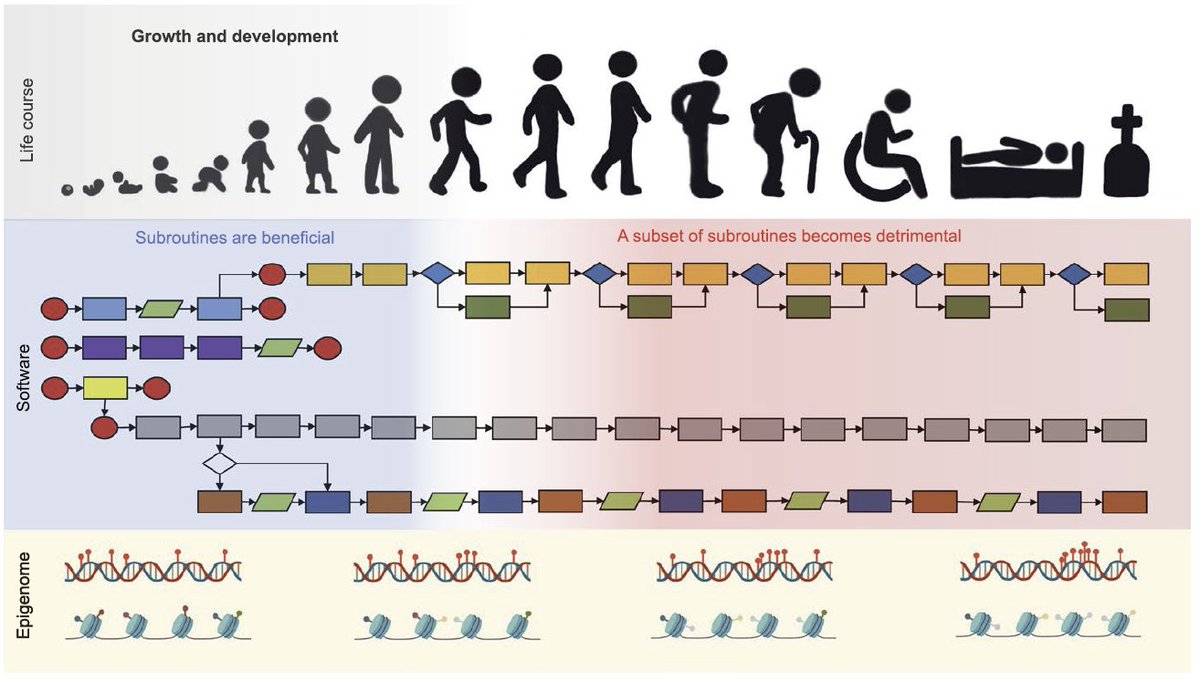Ageing as a Software Design Flaw: A Thread
The hypothesis is that most ageing changes are not a result of a build-up of molecular damage but are rather a product of regulated processes. This thread explores the idea that the genome is a developmental program encoded in the DNA sequence, and how ageing can be seen as a software design flaw.

João Pedro de Magalhães
Scientist planning to live forever (so far so good!), professor decoding the genome @unibirmingham, big data, geek, consultant, speaker, keen footballer.

-
A thread on ageing as a software design flaw 🧵
— João Pedro de Magalhães (@jpsenescence) March 28, 2023
The hypothesis is that most (but not all) ageing changes are not a result of a build-up of molecular damage but are rather a product of regulated processes.
Figures from the paper:https://t.co/BUgO5slc8P pic.twitter.com/k63om4841I -
Others (eg John Maynard Smith), have equated the genome to a developmental program encoded in the DNA sequence, a type of software - defined as the DNA code that orchestrates how a single cell develops into an adult organism. pic.twitter.com/mB0Go37InA
— João Pedro de Magalhães (@jpsenescence) March 28, 2023 -
As the program runs, numerous subroutines are called and operate in different spatial and temporal contexts.
— João Pedro de Magalhães (@jpsenescence) March 28, 2023
The program code is in the DNA sequence but runs in the epigenome, which in turn dictates gene expression and determines cellular phenotypes. -
Processes set in motion by the software program during development continue in adulthood.
— João Pedro de Magalhães (@jpsenescence) March 28, 2023
Because the program is optimized for reproduction, it fails to deactivate a subset of its subroutines which are beneficial during development but become detrimental later on. pic.twitter.com/X678WoCR9b -
As the software runs, its sequence of events is reflected in shifting cellular epigenetic states.
— João Pedro de Magalhães (@jpsenescence) March 28, 2023
This model thus fits the recent discovery of highly accurate epigenetic clocks ticking from shortly after conception until old age. -
The model may also explain species differences in ageing.
— João Pedro de Magalhães (@jpsenescence) March 28, 2023
How long it takes mammalian species to reach maturity is predictive of how long they live afterwards.
A mouse develops and ages much faster than a human being because its developmental software program runs much faster. pic.twitter.com/0ThKxYTEhh -
If ageing is an unintended outcome of a developmental program, this fits the major genetic, dietary, and pharmacological manipulations of ageing.
— João Pedro de Magalhães (@jpsenescence) March 28, 2023
Dietary restriction, GH/IGF1 inhibition, and rapamycin all also regulate growth and development. pic.twitter.com/zXKbfHPXNl -
But information is suppressed, not lost, during ageing.
— João Pedro de Magalhães (@jpsenescence) March 28, 2023
Nuclear transfer or reprogramming restart the developmental program and shift the epigenome towards an earlier state in the running of the software; cells are shifted towards a more youthful epigenetic information state. pic.twitter.com/VF0NvKpxuV -
That doesn't mean molecular damage doesn't play a role in ageing phenotypes.
— João Pedro de Magalhães (@jpsenescence) March 28, 2023
Cancer, in particular, is driven by mutations. In fact, avoiding cancer is one of the major evolutionary pressures that shaped the developmental software and hence ageing phenotypes. -
Overall, ageing is an information problem.
— João Pedro de Magalhães (@jpsenescence) March 28, 2023
I suggest that to understand ageing we need to decode our genetic software and the flow of epigenetic information throughout the life course.
For more details please check out the paper:https://t.co/BUgO5slc8P -
This builds upon the work + inspiration from many: the late Vladimir Skulachev, David Gems, @davidasinclair @drmichaelwest @Blagosklonny @geochurch the epigenetic clocks from Steve Horvath @DrMorganLevine et al. Thanks to @aubreydegrey @mkaeberlein @Lord_Lab et al for comments🙏
— João Pedro de Magalhães (@jpsenescence) March 28, 2023
